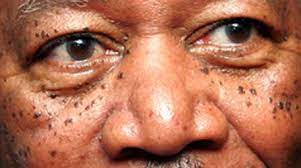Dermatosis Papulosa Nigra (DPN) is a common benign skin condition that primarily affects individuals with darker skin tones, particularly those of African or Asian descent. It is characterized by the presence of small, dark or black papules (bumps) on the face, specifically around the cheeks, forehead, and temples.
Here are some key points about Dermatosis Papulosa Nigra:
Appearance: DPN lesions are typically small (ranging from 1-5 mm), smooth, dome-shaped papules with a dark brown to black color. They may be flat or slightly elevated and have a velvety or rough texture.
Cause: The exact cause of DPN is unknown, but it is believed to be a hereditary condition. It is thought to result from a combination of genetic factors, sun exposure, and the aging process.
Symptoms: DPN lesions are usually asymptomatic and do not cause any discomfort or itching. They are primarily a cosmetic concern for individuals who seek their removal due to aesthetic reasons.
Diagnosis: A dermatologist can usually diagnose DPN based on their characteristic appearance and location. In some cases, a skin biopsy may be performed to confirm the diagnosis or rule out other skin conditions.
Treatment: Treatment for DPN is not medically necessary but is usually sought for cosmetic reasons. Several treatment options may be considered, including:
Cryotherapy: Freezing the lesions with liquid nitrogen to remove them.
Electrosurgery: Using a high-frequency electrical current to destroy or excise the lesions.
Laser therapy: Utilizing lasers to target and remove the pigmented papules.
Excision: Surgically removing the individual lesions using a scalpel or scissors.
It’s important to note that treatment outcomes may vary, and new lesions may appear over time, requiring further treatment sessions.
Prevention: There are no specific preventive measures for DPN since it is believed to have a genetic component. However, protecting the skin from excessive sun exposure and practicing good skincare habits may help maintain overall skin health.
If you are concerned about Dermatosis Papulosa Nigra or wish to explore treatment options, it is recommended to visit us at our skin clinic. Here we can evaluate your specific case, discuss the available treatments, and provide personalized recommendations based on your needs and preferences.

